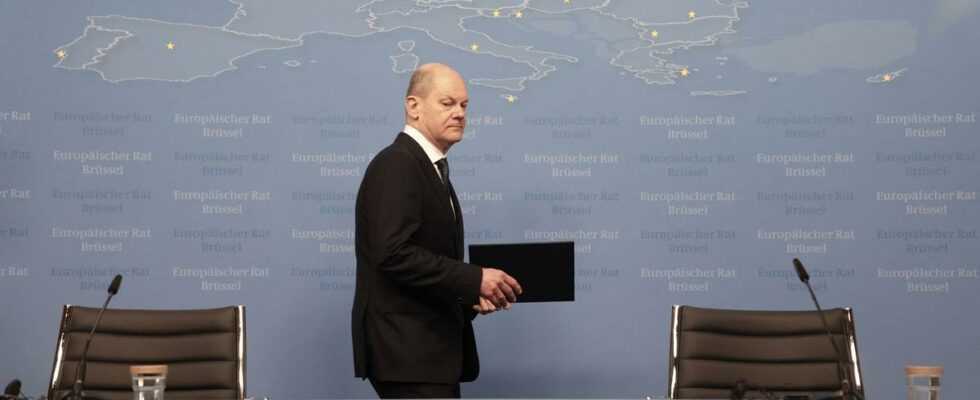After months of discussions, the heads of state and government finally reached a partial agreement on Friday.
Correspondent in Brussels
The question of energy was not a simple affair between the Twenty-Seven before the outbreak of the war in Ukraine. Since the beginning of the conflict, and while prices are soaring, it has taken on a lot of relief, driving fractures between the leaders as they must render accounts on the subject to their respective public opinion.
It must be said that the equation is infinitely complex. Europeans must both wean themselves as quickly as possible from Russian fossil fuels while tackling the filling of stocks to 80% to be sure of getting through next winter. All at a contained price, at least not scandalously high. Add to that highly variable energy mixes from one country to another and the desire not to abandon climate objectives.
Read alsoRussian gas: why does Vladimir Putin ask to be paid in rubles?
After months of discussions, the heads of state and government finally reached a partial agreement on Friday. It was no small feat. “I can’t say how many drafts there were for the conclusions (of the meeting, editor’s note). Some. On the other hand, there have undoubtedly been as many editorial amendments as there are participants.confided in the afternoon a diplomat.
Voluntary participation
The Commission will have a mandate to carry out joint purchases of gas, LNG and hydrogen. It will therefore do for energy what it has done with vaccines since the start of the Covid crisis. “We have enormous purchasing power. Therefore, I am glad that we are now using our collective bargaining power. Instead of outbidding each other, driving up prices, we will pool our demand.”, underlined the President of the Commission, Ursula von der Leyen. It is, said Emmanuel Macron, “the best instrument to bring down the price of our gas”, pointing out that the EU represents 75% of the world market for gas transported by pipeline. Participation in this system will, however, be voluntary. Germany might not join, at least initially. “Some member states have pleaded for a gradual increase in power”says a European diplomat.
Read alsoEnergy: can Europe do without Russian oil?
While time is running out to fill the stocks that will make it possible to get through next winter, the Member States have also decided to pool their storage capacity. Seven do not: Ireland, Greece, Slovenia, Estonia, Finland, Lituation and Luxembourg. The Council has been instructed by the Twenty-Seven to study the Commission’s proposals on this very technical question. But the idea is to bring solidarity between the Member States into play and to move towards more pooling.
Proposals on “emergency” measures
Above all, several taboos could be about to fall. The Commission has, in fact, been formally mandated by the Twenty-Seven to make proposals on measures “emergency” and “temporary” Member States seeing gas prices soar to levels that are difficult for consumers or taxpayers to take could be authorized to take. These measures include price caps. The European executive will also have to make proposals in May on the decoupling between the price of electricity and that of gas. The current system requires that the price of electricity be determined by that of the energy supplied by the power plant called upon to supply the last kilowatt hours missing from the network, which is generally a gas power plant and which can be activated at the last minute. Even if nothing is definitively acquired at this stage, it is a step forward for the southern countries, in particular Spain and Portugal.
Read alsoFuels: up to 18 cents per liter discount at the pump
Two groups of countries have been battling each other for months. On the one hand, the countries of “South”, led by Spain, France and Belgium in particular, which plead for a reform of the energy market. On the other side, Germany, the Nordics and the Dutch, much more cautious on the issue. These countries are concerned about the risks of such changes in a context of very high market volatility and very strong global demand.
